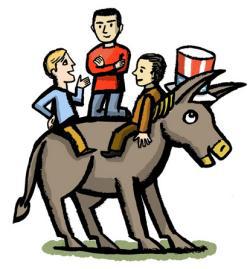Dave and Sasha,
Barack Obama’s task tonight is to talk about the future. He’s had some practice. “Win the Future!” was the slogan he unveiled at the 2011 State of the Union. That was then discarded for “Forward.” I wonder if we’ll get a new phrase tonight. The future is ahead of us?
Before Mitt Romney spoke in Tampa, I thought the Republican nominee’s biggest task of the night was to offer a single sentence that would live on. I don’t think he found one. The line comparing Obama’s lofty talk about the oceans to his concern for peoples’ families might be the best thing he offered, but it wasn’t stunning. (It may live on in climate change textbooks 100 years from now.)
We’ve talked a lot about how conventions get sent through the chop shop, where bits and pieces are shipped out to the various constituencies over time. I talked to Obama adviser David Plouffe this morning, and he said the real impact of the Clinton speech will be based on the press coverage, the parts we choose to highlight and what lives on through Twitter and Facebook. So what is Obama going to say that fits into 140 characters?
I think the Democratic base has already been worked up into pretty good shape for the president. Democratic voters who missed last night will still take the time to listen to what Bill Clinton said when their friend tells them to watch the YouTube clip. The Obama campaign will find ways to chop up what he said and get it out, and Democrats will be in a mood to listen. The campaign tells me it is planning to farm out Clinton content quite a lot in the coming weeks.
So tonight, for the president, it’s all about the swing voters. Are they watching? I don’t think many of them are. Or, if they are watching, they might like what they see but then change their mind again in a few weeks. We’ve seen that this race is impervious to events. The polls just stay stuck. So will anything live on from tonight? Will there be something that can be recycled in four weeks to bring people back to Obama? In that sense, these conventions are vast focusing exercises, which force the campaign to hone their thinking.
Another thought. What if I’m wrong, and what Obama needs is not 140 characters but a feeling that people can translate into their own 140 character expressions? (I know, you’re thinking that I should probably extinguish the incense and put down the hemp snacks.) What I wonder, though, is whether there is a modern equivalent of the Mandela quote about people not remembering what a politician says but remembering how he made them feel. The problem for Obama, of course, is that some voters might not trust that feeling this time around. They think that all Obama did in 2008 was make them feel good, but he couldn’t deliver on that feeling when he came to office. (All good intentions and poor execution.)
In that way, Obama is squaring off against himself tonight. If he’s great, he’ll recapture the magic and remind people why they liked him and why he deserves a second chance. But it’s also true that if he’s great, he’ll remind people of why they liked him, and that will highlight their disappointment. He’s the suitor who can muster up the right words on the anniversaries but who disappoints all the other days of the year. That makes those anniversaries ultimately unsatisfying, no matter how nice they may seem when the candles are burning and the flowers are still fresh.
So I’m looking for something that lives on—past the disappointment, past the audience’s conditioning to pretty words, and past tomorrow’s job numbers. Obama will know those numbers ahead of his speech. One of the tasks for a president is being able to compartmentalize. Even if those numbers are bad, he’ll have to forget that and plow ahead. He’ll hope the country is able to do a version of the same thing and hear what he has to say in a way that lasts beyond the 10 hours between the end of his speech and the release of the newest economic data.
John
Read the rest of Slate’s coverage of the Democratic National Convention.
